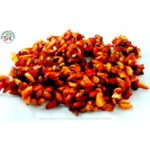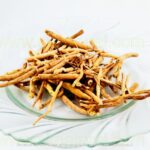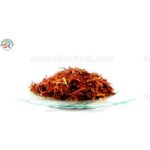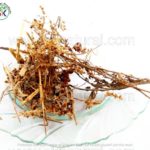Description
Gul Gafas, گل غفص, Delphinium zalil Aitch & Hemsl. This plant belongs to family “Ranunculaceae”. Physicians mostly, use flowers which are called “Gul e Ghafis”. Its temperament is warm and dry in third order or warm and dry in second order.
Arabic Name: Ghafith, Al-aiaq
Urdu Names: Ghafis, Daiphal, Gul Jalil, Gul Khalah, Khashiyatul-Ghafis
English Name: Delphinium
Sindhi Name: Gul gafas
Recommended dosage:
4-6 g. Physicians describe them as harmful (in large doses or prolong use) for spleen. The Delphiniums are poisonous if eaten raw.
Medicinal Uses:
Practitioners employ delphinium to alleviate inflammation affecting the liver and stomach, as well as disorders concerning the liver and spleen. They also utilize it in the treatment of edema, high blood pressure, and to combat persistent fevers.
It possesses a wide array of medicinal properties including alterative, anodyne, anthelmintic, antibilious, antioxidant, antipyretic, astringent, bitter, cholagogue, diaphoretic, digestive stimulant, hepatic, sialagogue, stomachic, and tonic. This herb also acts as a stimulant on the gallbladder and liver, encouraging them to function more effectively. Moreover, it nourishes the spleen, pancreas, stomach, and kidneys.
Both the Greeks and the Arabs historically employed it in preparations for stomach and liver ailments. It proves beneficial in conditions such as edema, splenitis, hepatitis, cirrhosis, stomatitis, and jaundice. Additionally, it stimulates appetite and digestion by enhancing the production of digestive juices, including saliva, gastric juices, and bile. It also accelerates gastric emptying.
They indicate this herb wherever there is a lack of appetite, sluggishness of the digestive system, dyspepsia, or flatulence. The overall toning effect of its bitter flavor contributes to its role in treating debility, anorexia, and exhaustion.
The plant contains various secondary metabolites, including alkaloids, glycosides, flavonoids, triterpenoids, and fats. In traditional medicine systems such as Unani and Ayurveda practitioners utilize it for its anti-inflammatory, antidepressant, antiulcerogenic, gastroprotective, and sudorific properties. In Turkey, it is recognized as a hepatoprotective and aphrodisiac plant. Uzbekistan Republic people, has been traditionally using it to alleviate common cold symptoms, indigestion, diarrhea, and stomachache. Additionally, the famous Unani antiviral formulation Kabdeen involves the use of extracts from this plant.
Sknatural provides you good quality gul gafas.






Reviews
There are no reviews yet.